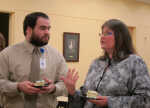Mercy congratulates its first School at Work graduate

Lisa Turner is Fort Scott's first graduate of the School at Work (SAW) program, instituted on July 2010 at Mercy Health Center.
The nine-month program partners a Mercy co-worker with a mentor to help the SAW participant explore career opportunities within Mercy and facilitate growth both professionally and personally, a news release said.
The program provides participants with the skills to move ahead, either by going back to school or seeking a promotion within the hospital. SAW participants choose to move ahead in one of four career ladders: nursing, allied clinical, clerical and support services. It is a chance for Mercy to "grow" its workforce and to increase diversity in nursing, allied clinical and front-line leadership positions, a news release said.
"I would definitely recommend the program to other co-workers," Turner said. "A couple key points I learned are: 1) math is manageable and 2) the program gave me a framework to assess my own skills and indentify deficits which could be potential stumbling blocks in the future."
Currently an admitting representative at Mercy Health Center, Turner is now eyeing a career in either health care education or cardiac sonography.
"Mercy has developed an approach over the years to hire individuals who fit with our mission and values," said Darren Henson, Mercy vice president of Mission and Ethics. "We look for those who show a passion for the things that matter most to us. Once someone becomes a Mercy co-worker, we hope they will be with us long term. One way we can do this is by helping the individual develop his or her gifts and talents."
Managers at other Mercy locations that offer the SAW program have reported improvements in confidence, attitude, job performance and fewer attendance issues. There is no cost to the employee or the department.
Although the program does not guarantee a promotion, on average 17 percent of SAW students are promoted to a higher level position within 90 days of completing the program.
"School at Work is a workforce development system provided to increase job advancement, retention and career development for entry-level workers," explained Robert Taylor, Turner's SAW mentor. "In today's hospital environment, nursing shortages, other allied health workers continue to be needed to accommodate the increasing patient load," he said.
By providing SAW to interested and qualified entry-level workers, it has placed emphasis on retention and advancement of entry level personnel into clinical, clerical, and support roles, he said.
The SAW "Building a Career Ladder in Healthcare" program uses the Internet, computer labs, DVDs and staff coaching to deliver instruction.
Co-workers review basic reading, writing and math skills; improve computer proficiency; study medical terminology, medical ethics, anatomy and physiology. Students also develop an individual career and learning plan to follow in reaching their goals.
